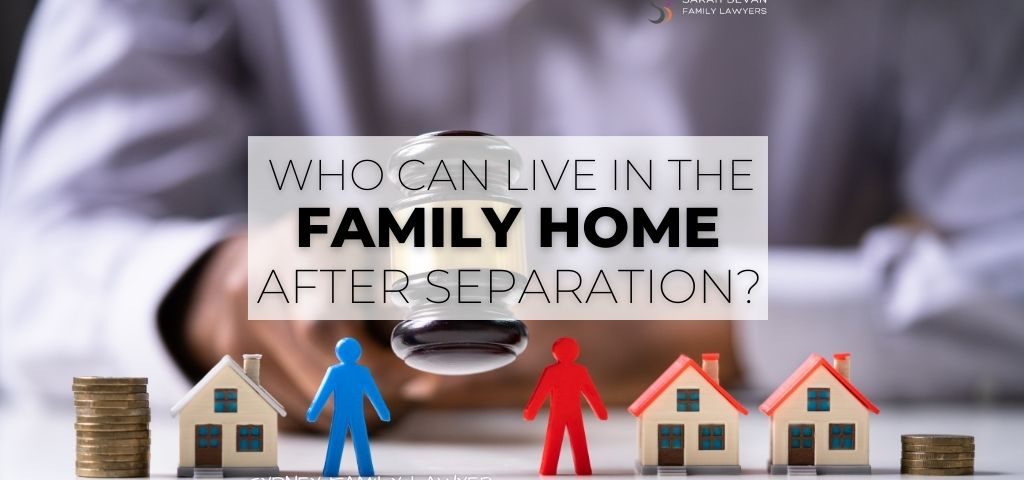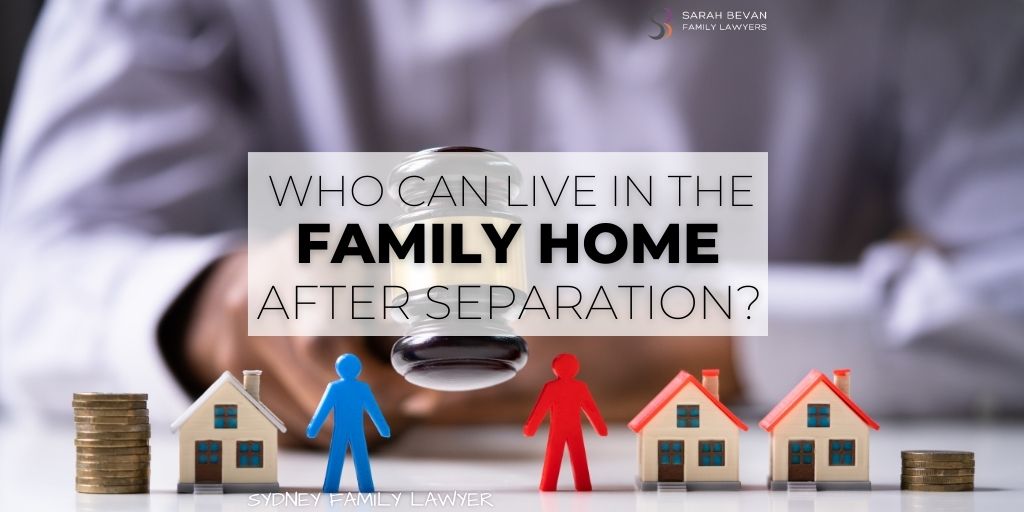- Sydney Family Lawyers
- (02) 9633 1088
- mail@sbfamilylawyers.com.au
Who can live in the home after separation?
Separation is a difficult and challenging time and often couples do not have the means to move into separate accommodation while going through the process of formalising their property settlement and parenting arrangements.
We are often asked, “Who has a right to live in the home when we have separated?”.
In the recent case of Elliott & Hopkins (No 2) [2023] FedCFamC1A 142, the Court was required to consider and clarify what are the relevant factors when determining who can remain in the matrimonial home.
In this case, the parties were married and had been in a relationship for approximately 7 years. Shortly after separation, the husband filed an application with the Court seeking an order for the wife to vacate the matrimonial home. In response, the wife sought orders that she have sole use and occupation of the home.
The property was owned in the name of the husband and the parties had lived in the property throughout the relationship. The wife was residing in the home at the time the Court proceedings were commenced. At the time the husband’s assets and business were security for significant debts owed to the bank and the Australian Tax Office.
Orders were made for the wife to vacate the property, which she failed to do, so the husband filed an enforcement application and as a result a warrant was issued for possession of the property.
The wife appealed the decision to vacate the property and produced evidence of 2 apprehended violence orders that had been made against the husband for the protection of the wife.
On appeal, the Full Court rejected the arguments put forward by the wife and confirmed that the primary judge had appropriately applied discretion to the relevant factors when determining who will have exclusive occupation of a property, which include:
- the fact that the Husband was the legal owner of the property;
- the financial circumstances of each of the parties (including income and capacity to service the mortgage);
- the Wife’s apparent inability to retain the property after the final hearing;
- the Wife’s contended homelessness (although the primary judge did not accept that would necessarily be so);
- the existence of an ADVO protecting the Wife; and
- hardship which might be occasioned to each party.
Relevant factors a Court will consider regarding the family home
Several factors are considered by the court when determining who can remain in the matrimonial home during and after a divorce or separation. These are often complex and can vary depending on your specific circumstances and jurisdiction, but some key points include:
Financial factors such as:
- Ownership of the property
Who owns the house? Is it solely owned or jointly, such as Tenants-in-Common or Joint Tenants?
Did one partner contribute more financially to the purchase or pay more towards the mortgage? - Income and financial needs
Who has the greater financial ability to maintain the property?
Who could realistically support themselves and any children in another property?
Dependence on the matrimonial home
- Does one partner have a greater need to stay in the home due to health issues, childcare arrangements, or family support / cultural / emotional well-being?
Child-related factors
- Children’s best interests
Which parent or guardian can best in serve the stability and well-being of the children (factoring in their ages, requirements, and preferences) by staying in the matrimonial home. - Children’s primary carer
Who has primary custody of the children? Is living near the other parent vital for maintaining a positive and meaningful relationship with them?
Practical factors
- Length of cohabitation
How long did the couple live in the property? Together or separately. - Possible housing options
Does one partner have access to other housing solutions that is readily available and affordable? - Impact on the property
Would one partner remaining cause undue hardship or damage to the property?
Other factors
- Domestic violence
Has any domestic abuse occurred during the relationship? If so, has the safety and well-being of the victim been considered? - Amicable agreement between parties
Can both partners reach an amicable agreement about who stays in the home to avoid conflict and court involvement?
Who gets to stay in the house during separation in Australia?
When considering who will remain in the property, the Court will have regard to the above factors and make a determination based on those considerations. There is no automatic right to stay in the matrimonial home after separation. Each case is unique, and the court will make a decision based on the specific circumstances and the best interests of all involved, particularly any children.
In many cases the Court will allow both parties to remain in the property.
Obtaining orders from the Court for sole use of a family home can be very difficult, and it is necessary to obtain specialist legal advice. Contact SB Family Lawyers to help you with your situation and understand your rights. The right advice from an experienced family lawyer can save a lot of time, expense and emotional turmoil.
This article is written by Alison Brown, Senior Associate and Accredited Specialist in Family Law.




